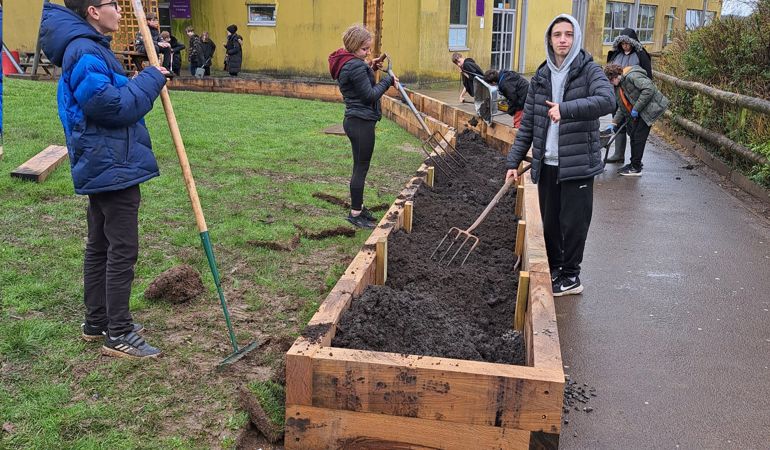Growing and nurturing a sustainable ‘Dyfodol’ at Brynteg Comprehensive School, Bridgend

In recognition of the diverse needs of pupils, Brynteg Comprehensive School, Bridgend has established a provision for learners in years 7-9 called Dyfodol. Meaning ‘future’, their Dyfodol provision supports learners who may find the normal timetabling of a comprehensive school challenging. We spoke to Lauren Feeley, the Dyfodol Provision Learning Coordinator to learn how the Dyfodol provision maximises the opportunities to learn in, about and for the natural environment.
“We currently have a Year 7, 8, and 9 class with the addition of a Year 10 class in September. The Dyfodol provision at Brynteg School offers pupils a full-time provision with access to secondary learning experiences with the aim of providing a curriculum tailored to each individual pupil to effectively bridge the gap between primary and secondary school. Pupils are taught literacy, numeracy, and humanities subjects within the provision, and they access the following practical subjects in the secondary setting; Art, D&T, Textiles, Food, Science, and PE, as well as any other subjects’ pupils express an interest in. Within the Dyfodol provision, a pupil’s curriculum is truly built around their individual needs and interests. It actively promotes a growth mindset and focuses on social and emotional wellbeing. Dyfodol aims to provide pupils with the tools to cope with secondary classes. It creates a calm, inviting environment where pupils are comfortable to talk and ask questions. Pupils are actively encouraged to express their opinions, work towards independence, and build self-esteem.”
“Having worked in primary school settings for all my career, I made the move to secondary in September 2021 when the Dyfodol provision was created. Due to the nature of the Dyfodol classes, it made perfect sense to promote the use of outdoor learning pedagogy throughout the provision. Having always had a love of the outdoors, I started working towards my Forest School Leader qualification last year. With the help of pupils and my nature enrichment group, we’ve established a Forest School area in the lower school. We’ve also been very fortunate to work with Keep Wales Tidy on a project developing an outdoor area in school. The pupils spent several weeks planting bulbs, laying wildflower turf, planting hedgerows and fruit trees, building a shed, filling, and planting up newly built planters with plants and herbs, putting together a polytunnel, and digging out a new pond area (very exciting!!). We hope to work with other businesses and organisations in the future to support, expand and develop our natural area.”
“Pupils from across the different year groups who access curriculum support take part in Forest School with my colleague Miss Lewis, as well as the Dyfodol pupils who have access to Forest School and our new outdoor area. As a provision, we are very fortunate that we can be flexible with the timetables. We have the pupils for most of the day which allows us to have time outside whenever suitable. Our plan in a nutshell, is to get the pupils out as much as possible! The classes have expressed an interest in ‘growing their own’ and seeing something develop from seed to table. They would love to grow vegetables to then use in campfire recipes within our Forest School sessions. Pupils have also spoken about having an area to just simply be and enjoy nature as they find it calming. This area could be more of a multi-sensory area that could be used by all. It would be great to get the parents, carers, and local community involved in our future plans.”
“The huge benefits of getting pupils outside have become more apparent to me as I’ve worked through my Forest School training. There has been an outstanding positive impact on both pupils and staff’s well-being during, and after, spending time outdoors, even when we’ve spent time outside in the rain! I think it’s important for pupils and staff to see each other potentially out of their comfort zone and learning together. It's great to see pupils who sometimes struggle or can be withdrawn in a classroom setting, completely change when out in the natural environment. Whether that is making new connections with peers, completing tasks to the best of their ability, taking on a leadership role, or building in confidence. There is an increase in engagement, particularly with boys, when taking part in tasks outside. One pupil commented after a recent session that he was so focused that other pupils had to check if he was still awake as they hadn’t heard from him in a while! It has also been evident that after spending time outside, the work produced in the classroom is of a higher quality and pupils tend to generally be happier in themselves during the rest of the day. We share and celebrate our outdoor learning adventures with parents and the wider world through our @DyfodolBrynteg1 Twitter account.
“We recently studied Hatchet and the pupils were asked to create a 'How to survive in the wild' infographic followed by a full day outdoors where they put their skills to use. Pupils were challenged to work as a team to create a shelter suitable to withstand the elements while the other team put their outdoor culinary skills to use. The day combined several aspects of the LNF all while enjoying the outdoors and promoting pupil well-being. I love that the new Curriculum for Wales values the importance of taking the pupils into the outdoors, it means we can address the four core purposes in a creative, real-life, authentic context. For example, taking a classroom maths concept which the pupils struggle to see a purpose for and will say “when are we ever going to use this?”. Taking it outdoors gives the concept a real-life context, in turn helping them to connect it to their own lives. Allowing pupils to contextualise their learning creates the ambitious, capable learners we are striving for.”
